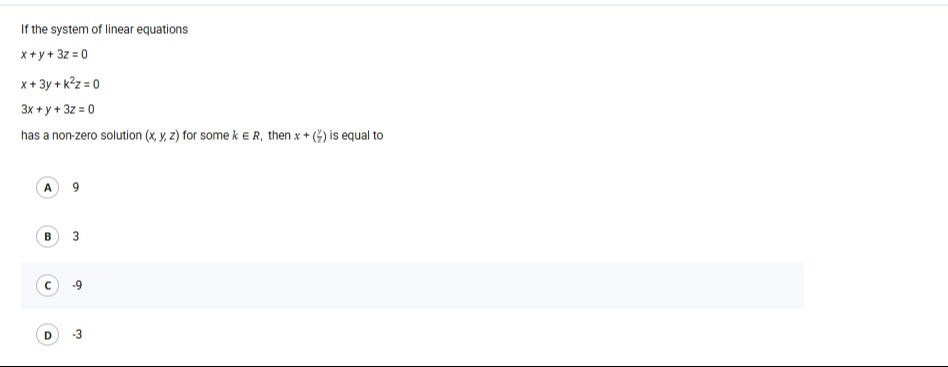Question
Question: If the system of linear equations $x+y+3z = 0$ $x + 3y + k^2z = 0$ $3x + y + 3z = 0$ has a non-z...
If the system of linear equations
x+y+3z=0
x+3y+k2z=0
3x+y+3z=0
has a non-zero solution (x,y,z) for some k∈R, then x+(zy) is equal to

9
3
-9
-3
-3
Solution
For a homogeneous system of linear equations to have a non-zero (non-trivial) solution, the determinant of its coefficient matrix must be zero.
The given system of equations is:
- x+y+3z=0
- x+3y+k2z=0
- 3x+y+3z=0
The coefficient matrix A is: A=1131313k23
For a non-zero solution, we must have det(A)=0. Let's calculate the determinant: det(A)=131k23−113k23+31331
det(A)=1((3)(3)−(k2)(1))−1((1)(3)−(k2)(3))+3((1)(1)−(3)(3))
det(A)=(9−k2)−(3−3k2)+3(1−9)
det(A)=9−k2−3+3k2+3(−8)
det(A)=2k2+6−24
det(A)=2k2−18
Set det(A)=0:
2k2−18=0
2k2=18
k2=9
Now substitute k2=9 back into the system of equations:
- x+y+3z=0
- x+3y+9z=0
- 3x+y+3z=0
We need to find the values of x,y,z (or their ratios) that satisfy these equations. Consider equations (1) and (3): x+y+3z=0 (1) 3x+y+3z=0 (3)
Subtract equation (1) from equation (3): (3x+y+3z)−(x+y+3z)=0−0
2x=0
x=0
Now substitute x=0 into equation (1): 0+y+3z=0
y=−3z
Let's verify these values with equation (2) (substituting x=0 and k2=9): 0+3y+9z=0
3y+9z=0
3y=−9z
y=−3z
This is consistent with the result from equation (1).
Since the problem states there is a non-zero solution (x,y,z), it means (x,y,z)=(0,0,0). From x=0 and y=−3z, if z=0, then y=0 and x=0, which would give the trivial solution (0,0,0). Therefore, z must be non-zero. This ensures that zy is well-defined.
Finally, we need to calculate x+(zy). Substitute the values we found: x=0 and y=−3z.
x+(zy)=0+(z−3z)
Since z=0, we can cancel z:
x+(zy)=0+(−3)
x+(zy)=−3
